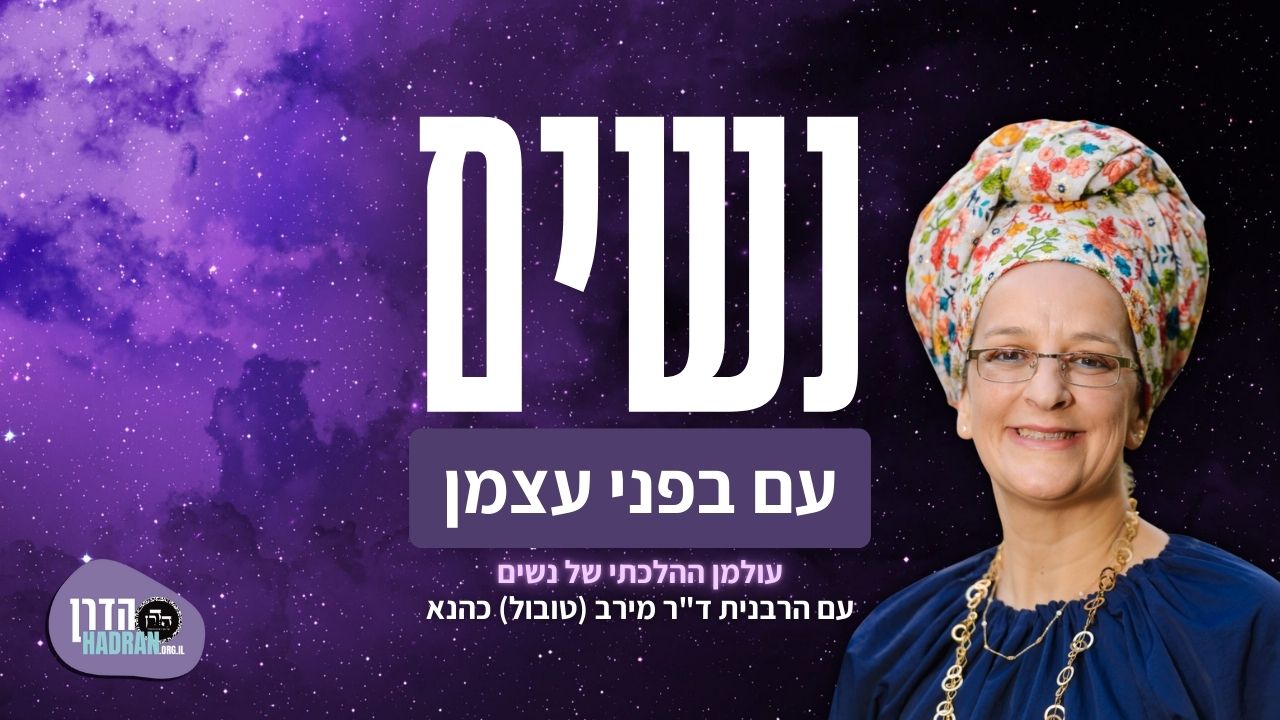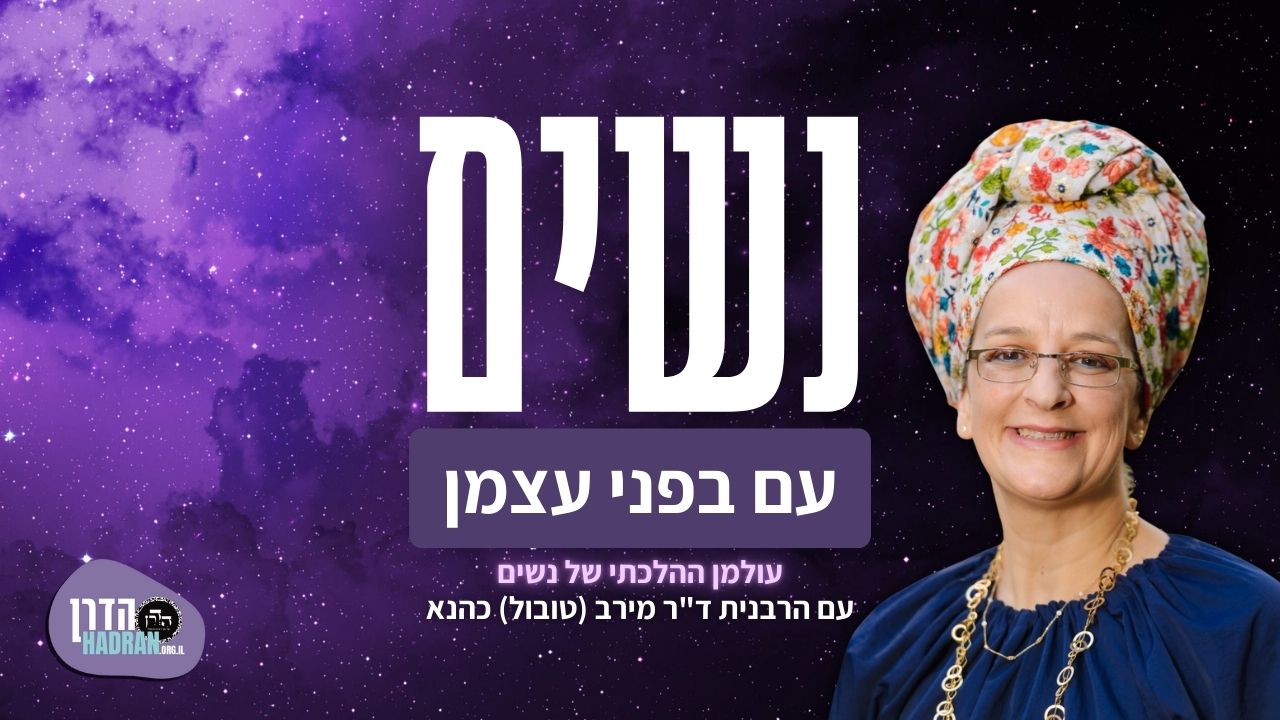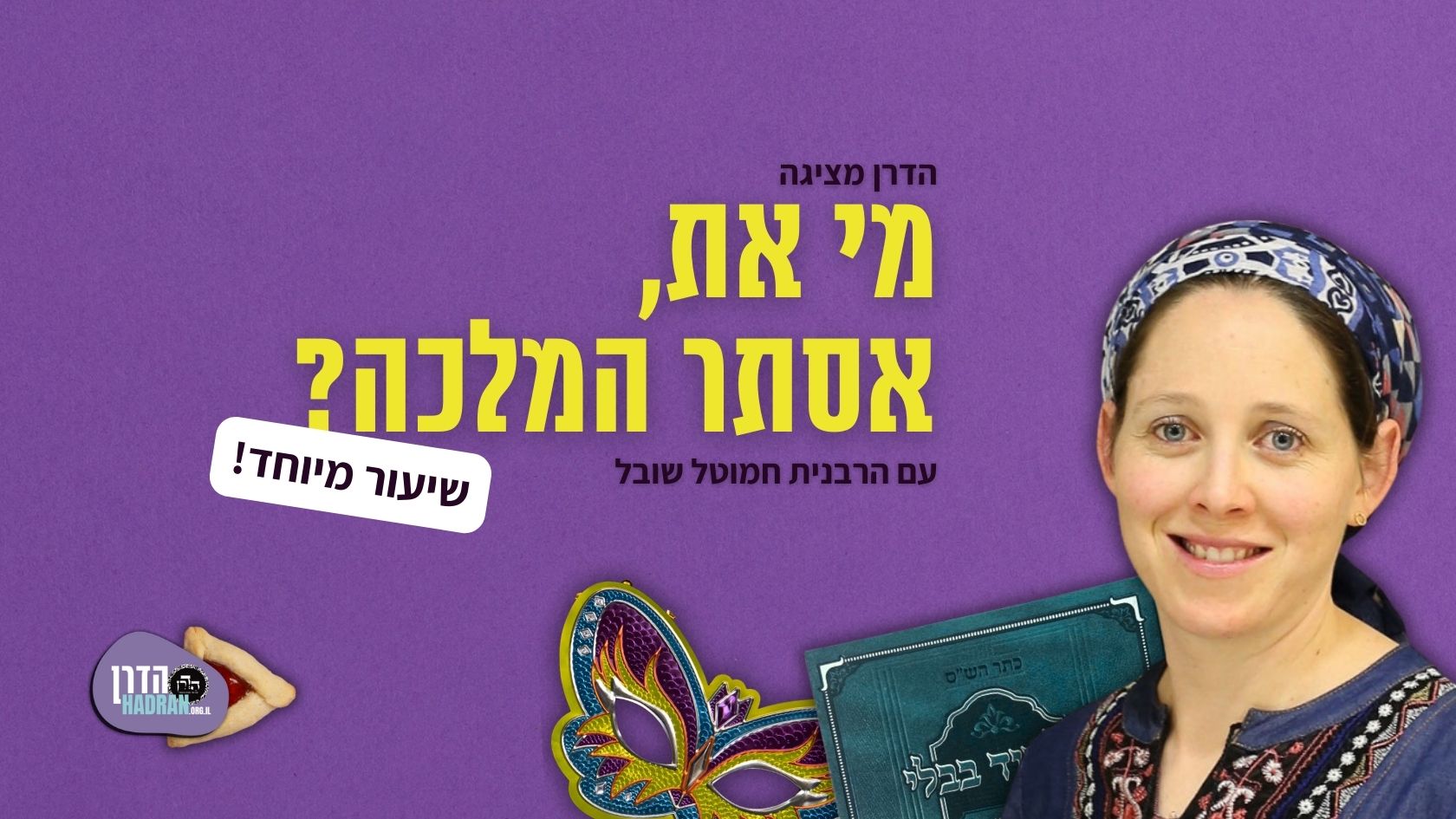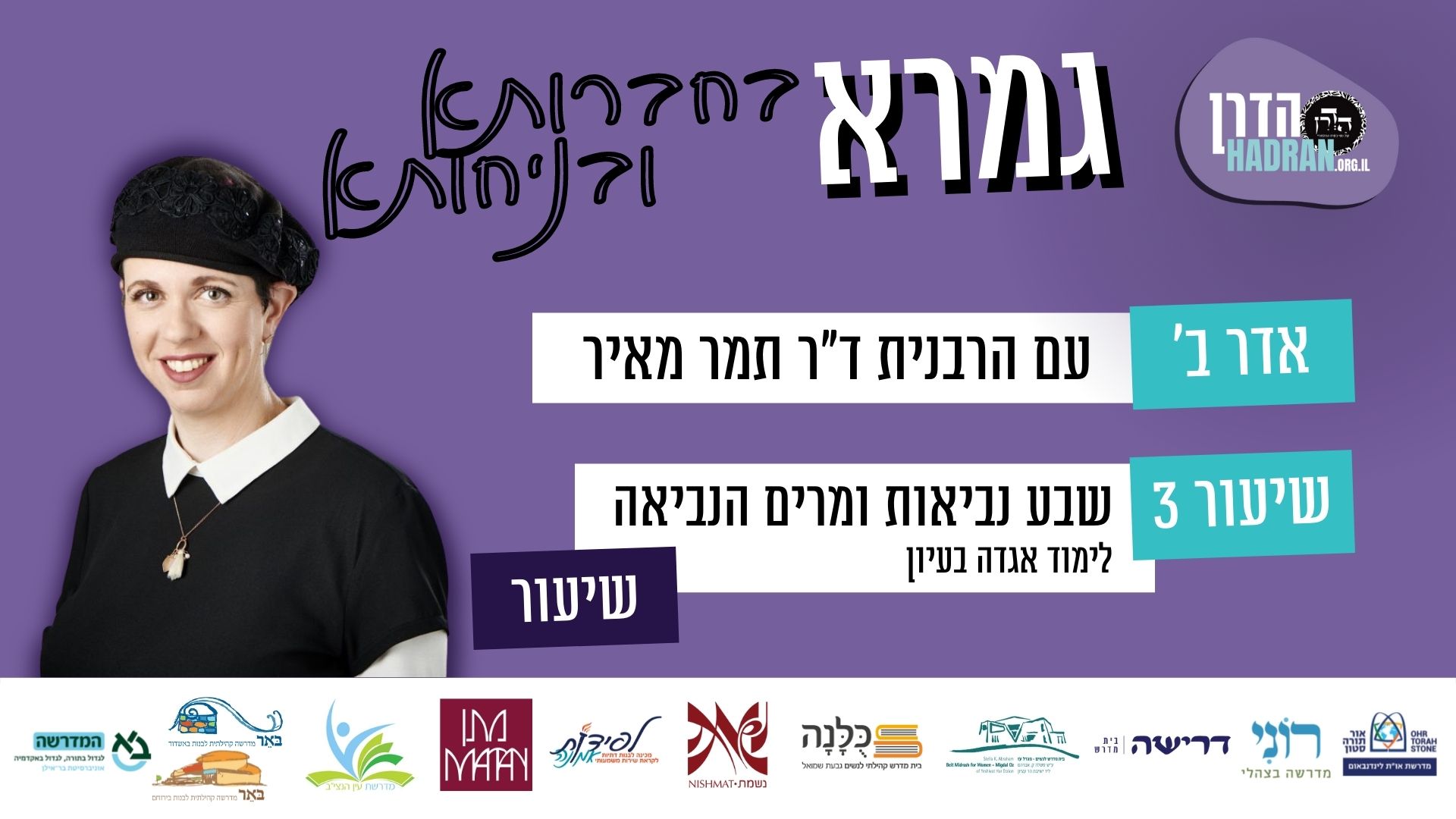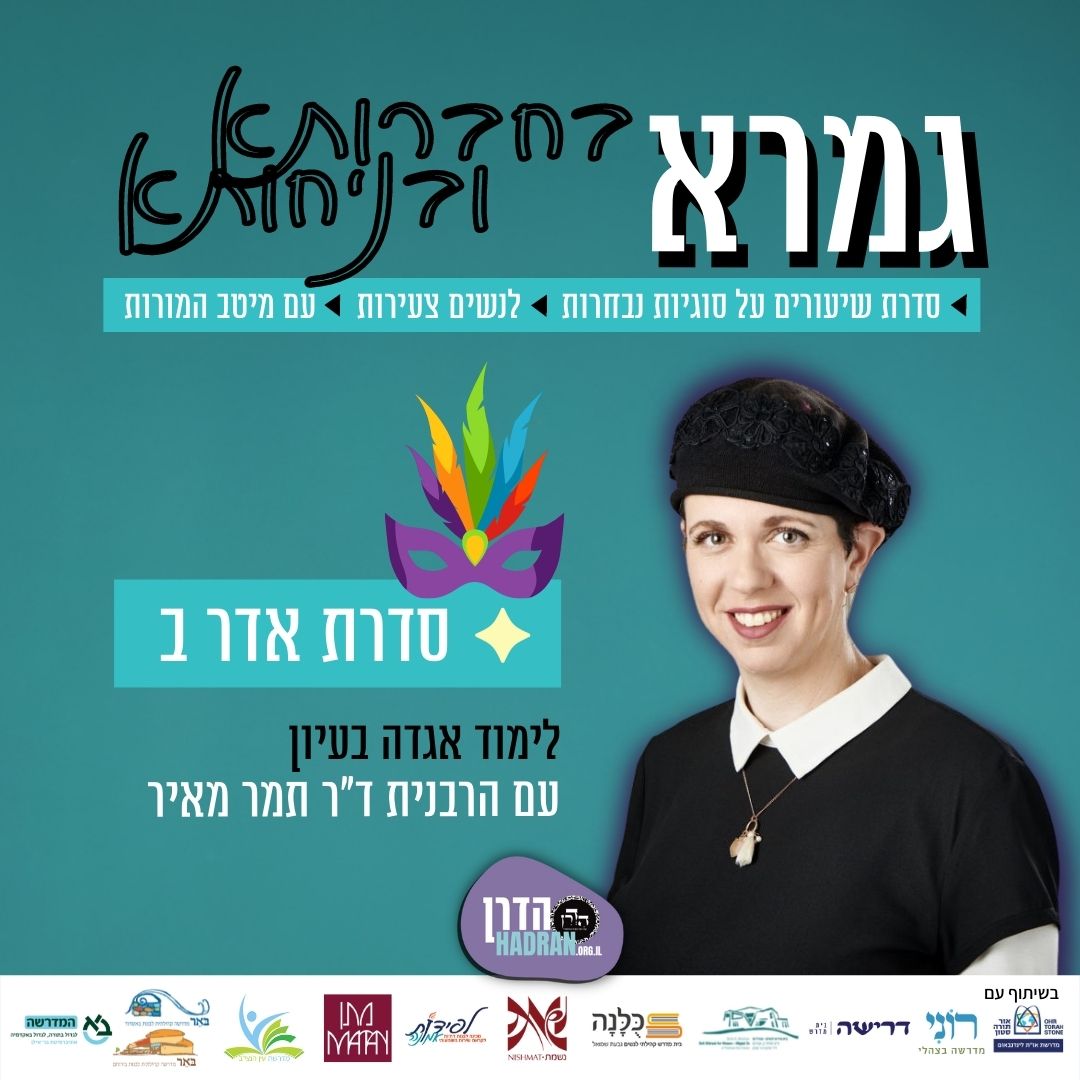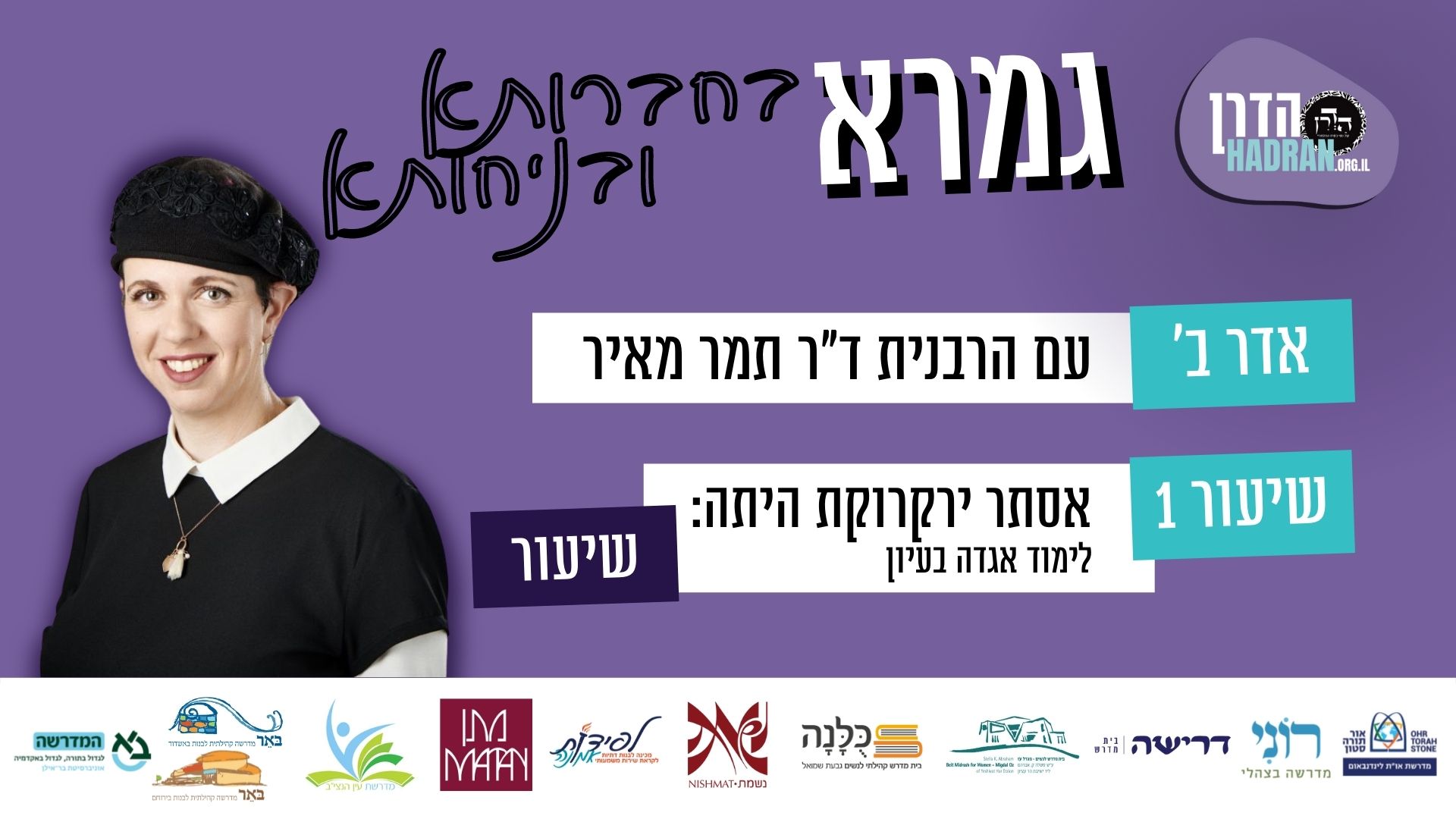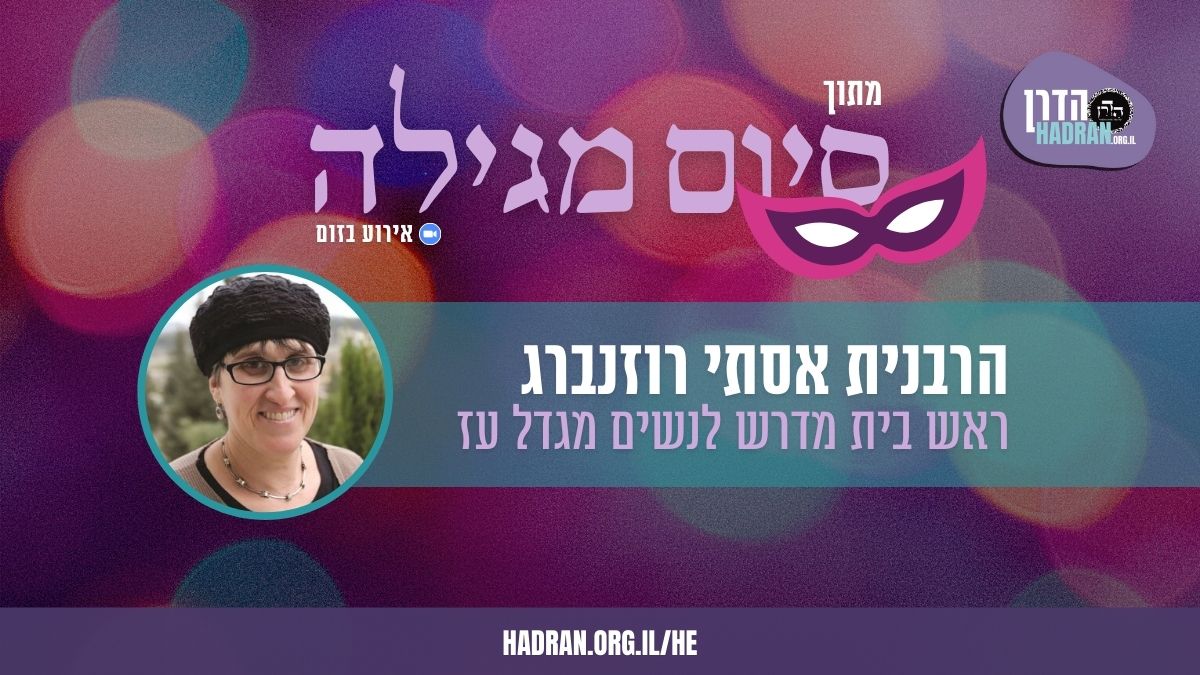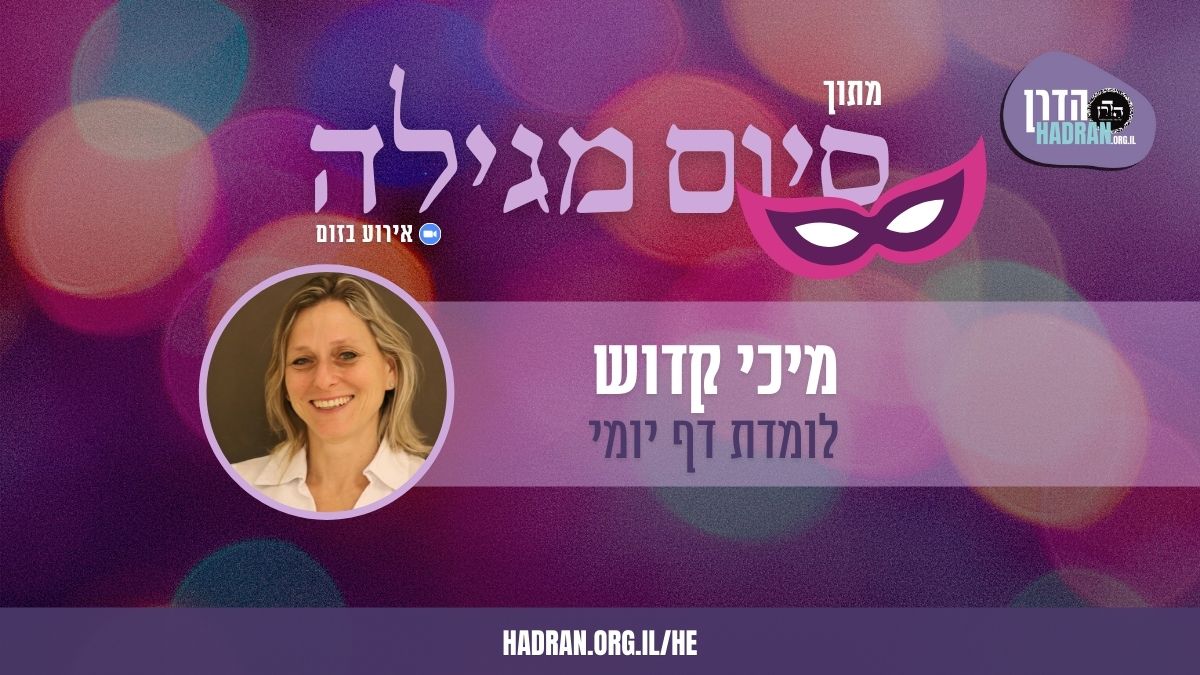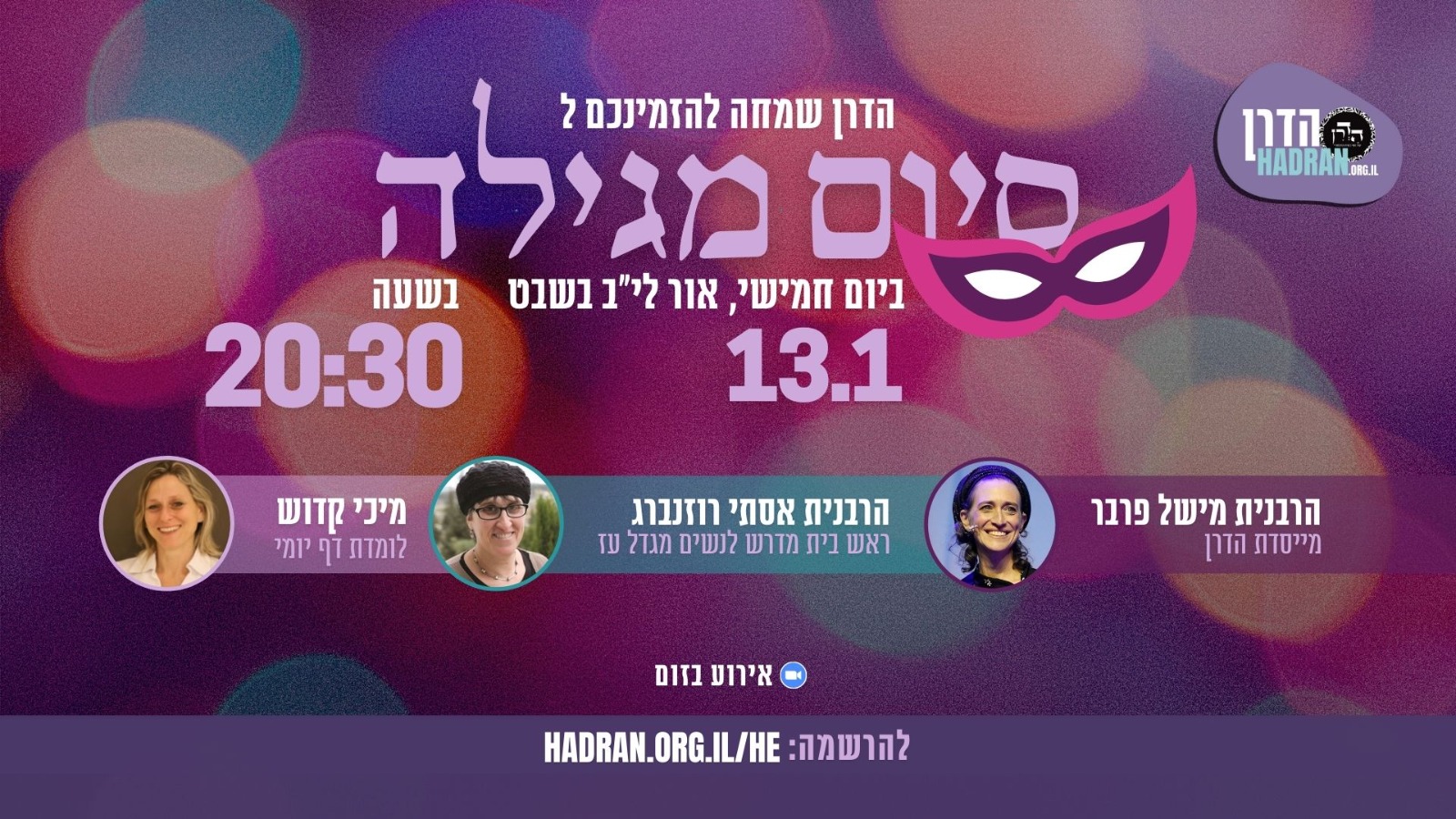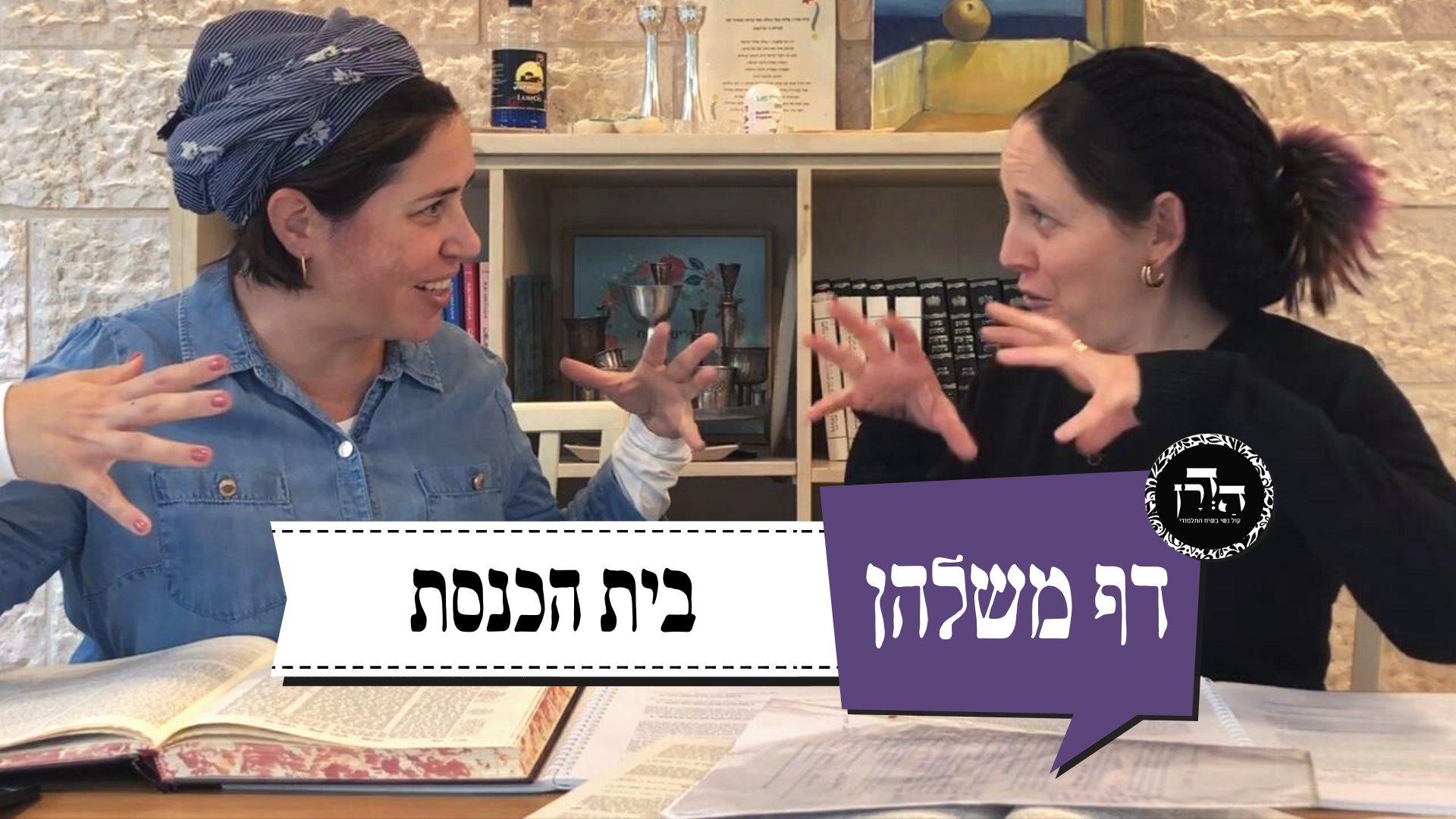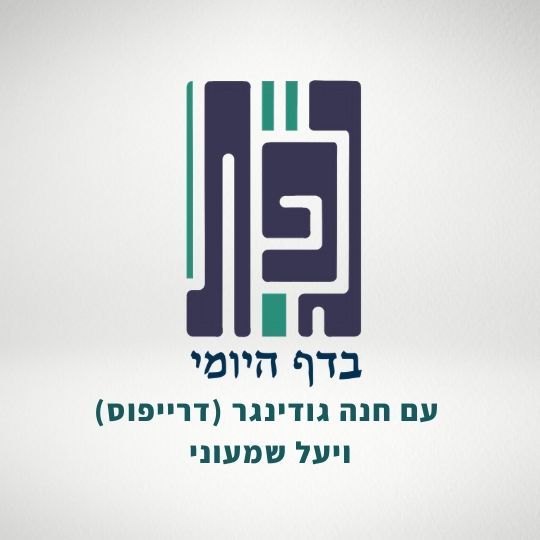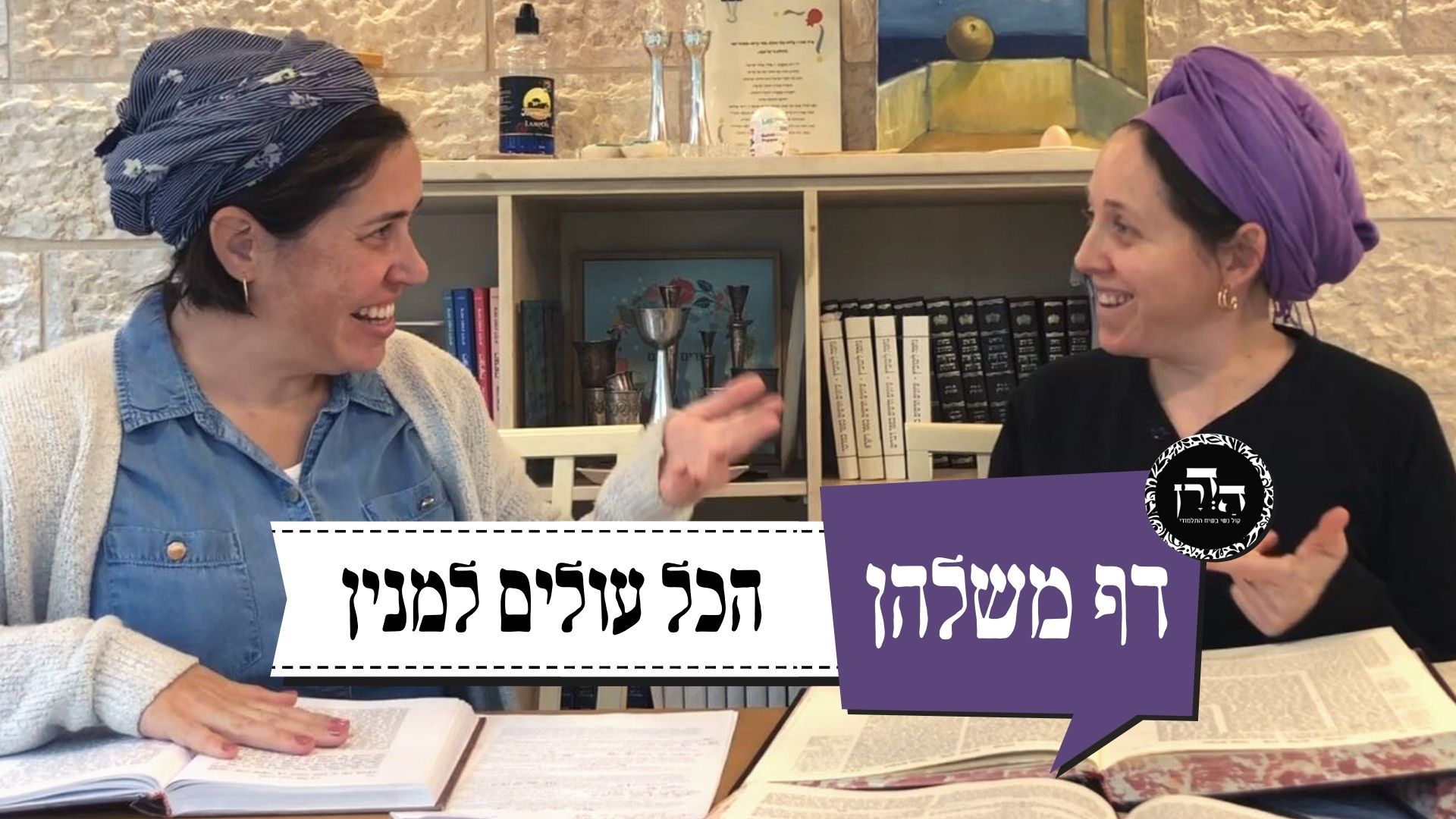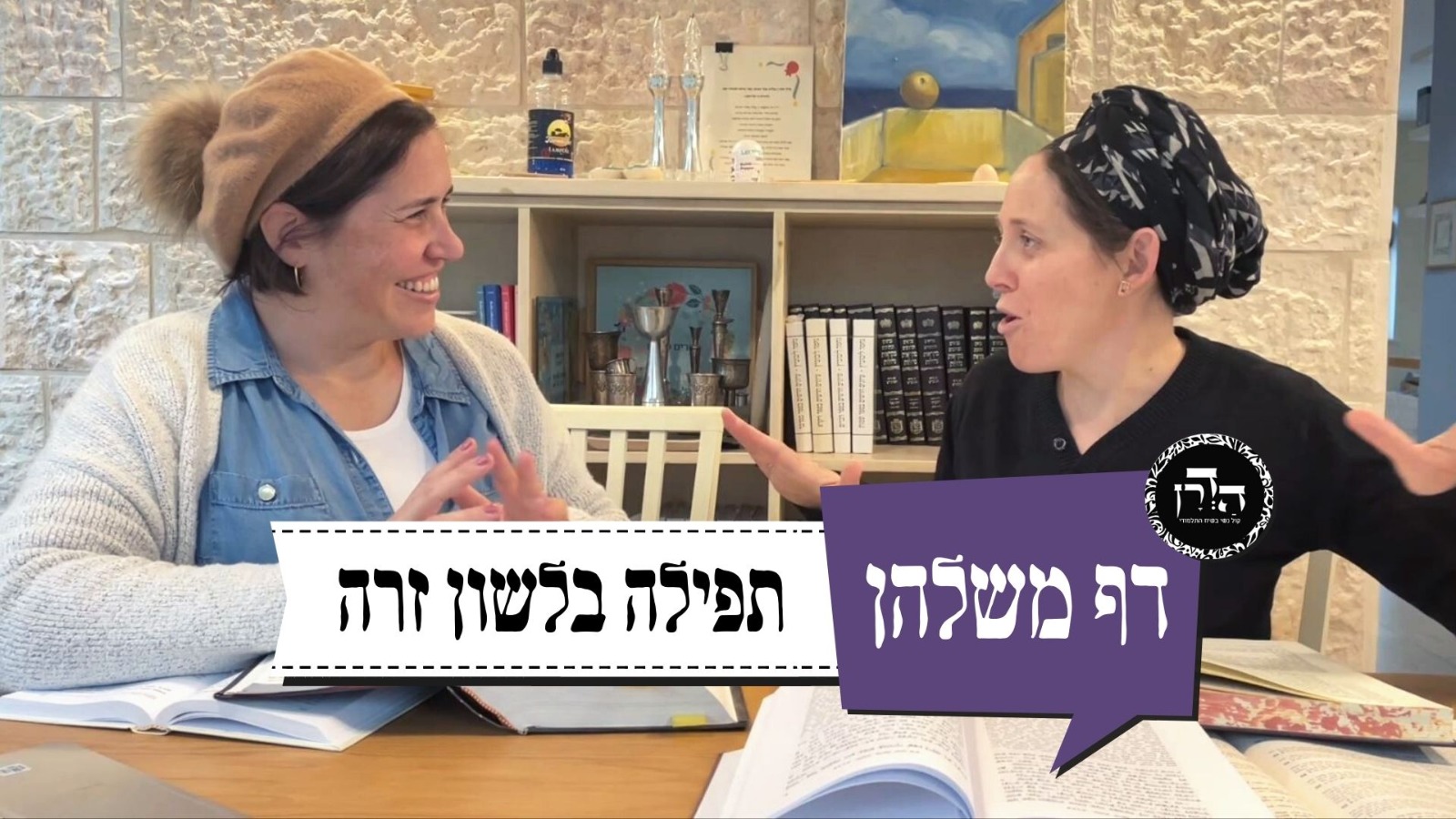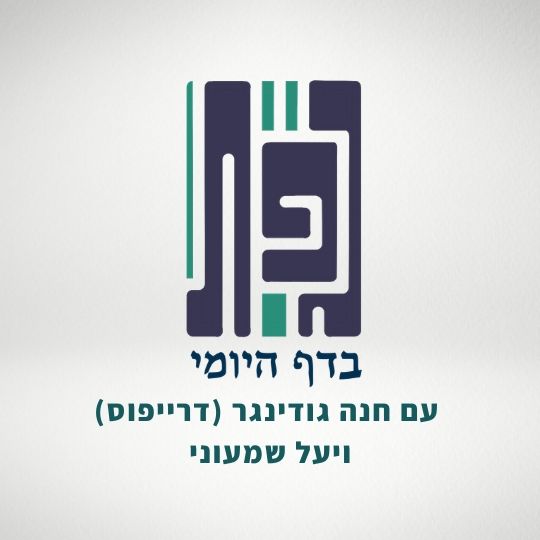מגילה כה
״יְבָרְכוּךָ טוֹבִים״ — הֲרֵי זוֹ דֶּרֶךְ הַמִּינוּת. ״עַל קַן צִפּוֹר יַגִּיעוּ רַחֲמֶיךָ״, וְ״עַל טוֹב יִזָּכֵר שְׁמֶךָ״, ״מוֹדִים מוֹדִים״ — מְשַׁתְּקִין אוֹתוֹ.
May the good bless You, this is a path of heresy, as heretics divide the world into two domains, good and evil. If one says the following in his prayers: Just as Your mercy is extended to a bird’s nest, as You have commanded us to send away the mother before taking her chicks or eggs (see Deuteronomy 22:6–7), so too extend Your mercy to us; or: May Your name be mentioned with the good; or: We give thanks, we give thanks, twice, he is suspected of heretical beliefs and they silence him.
הַמְכַנֶּה בַּעֲרָיוֹת — מְשַׁתְּקִין אוֹתוֹ. הָאוֹמֵר: ״׳וּמִזַּרְעֲךָ לֹא תִתֵּן לְהַעֲבִיר לַמּוֹלֶךְ׳, לֹא תִתֵּן לְאַעְבָּרָא בְּאַרְמָיוּתָא״ — מְשַׁתְּקִין אוֹתוֹ בִּנְזִיפָה.
If one modifies the text while reading the laws of forbidden sexual relations, i.e., he introduces euphemisms out of a sense of propriety, they silence him. Similarly, if one says while translating the verse: “And you shall not give any of your seed to set them apart to Molekh” (Leviticus 18:21): And you shall not give any of your seed to impregnate an Aramean woman, he is silenced with rebuke.
גְּמָ׳ בִּשְׁלָמָא ״מוֹדִים מוֹדִים״ — דְּמִיחֲזֵי כִּשְׁתֵּי רָשׁוּיוֹת. ״וְעַל טוֹב יִזָּכֵר שְׁמֶךָ״ נָמֵי, דְּמַשְׁמַע: עַל טוֹב — אִין, וְעַל רַע — לָא, וּתְנַן: חַיָּיב אָדָם לְבָרֵךְ עַל הָרָעָה כְּשֵׁם שֶׁהוּא מְבָרֵךְ עַל הַטּוֹבָה. אֶלָּא: ״עַל קַן צִפּוֹר יַגִּיעוּ רַחֲמֶיךָ״ מַאי טַעְמָא?
GEMARA: The mishna cites three instances where the communal prayer leader is silenced. The Gemara clarifies: Granted, they silence one who repeats: We give thanks, we give thanks, as it appears like he is acknowledging and praying to two authorities. And, granted, they also silence one who says: May Your name be mentioned with the good, as this formulation indicates one is thanking God only for the good and not for the bad, and we learned in a mishna (Berakhot 54a): One is obligated to bless God for the bad just as he blesses Him for the good. However, in the case of one who recites: Just as Your mercy is extended to a bird’s nest, what is the reason that they silence him?
פְּלִיגִי בַּהּ תְּרֵי אָמוֹרָאֵי בְּמַעְרְבָא: רַבִּי יוֹסֵי בַּר אָבִין וְרַבִּי יוֹסֵי בַּר זְבִידָא, חַד אָמַר: מִפְּנֵי שֶׁמֵּטִיל קִנְאָה בְּמַעֲשֵׂה בְרֵאשִׁית, וְחַד אָמַר: מִפְּנֵי שֶׁעוֹשֶׂה מִדּוֹתָיו שֶׁל הַקָּדוֹשׁ בָּרוּךְ הוּא רַחֲמִים, וְאֵינָן אֶלָּא גְּזֵירוֹת.
Two amora’im in the West, Eretz Yisrael, disagree about this question, Rabbi Yosei bar Avin and Rabbi Yosei bar Zevida. One said that this was because one who says this engenders jealousy among God’s creations, as it appears as though he is indicating that God favored one creature over all others. And one said that saying this is prohibited because one transforms the attributes of the Holy One, Blessed be He, into expressions of mercy, and they are nothing but decrees of the King that must be fulfilled without inquiring into the reasons behind them.
הַהוּא דִּנְחֵית קַמֵּיהּ דְּרַבָּה, אֲמַר: אַתָּה חַסְתָּ עַל קַן צִפּוֹר — אַתָּה חוּס וְרַחֵם עָלֵינוּ! (אַתָּה חַסְתָּ עַל ״אוֹתוֹ וְאֶת בְּנוֹ״ — אַתָּה חוּס וְרַחֵם עָלֵינוּ.) אֲמַר רַבָּה: כַּמָּה יָדַע הַאי מֵרַבָּנַן לְרַצּוֹיֵי לְמָרֵיהּ. אֲמַר לֵיהּ אַבָּיֵי: וְהָא ״מְשַׁתְּקִין אוֹתוֹ״ תְּנַן!
The Gemara relates that a particular individual descended before the ark as prayer leader in the presence of Rabba, and said in his prayers: You have shown mercy to birds, as expressed through the mitzva to chase away the mother bird before taking eggs from its nest; have mercy and pity upon us. You have shown mercy to animals, as expressed through the prohibition against slaughtering an animal and its offspring on the same day; have mercy and pity upon us. Rabba said: How much does this rabbi know to appease the Lord, his Master! Abaye said to him: Didn’t we learn in the mishna that they silence him?
וְרַבָּה, לְחַדּוֹדֵי לְאַבָּיֵי הוּא דִּבְעָא.
The Gemara explains: And Rabba, too, held in accordance with this mishna but merely acted this way because he wanted to hone Abaye’s intellect. Rabba did not make his statement to praise the rabbi, but simply to test his nephew and student, Abaye, and to encourage him to articulate what he knows about the mishna.
הַהוּא דִּנְחֵית קַמֵּיהּ דְּרַבִּי חֲנִינָא, אָמַר: ״הָאֵל הַגָּדוֹל הַגִּבּוֹר וְהַנּוֹרָא הָאַדִּיר וְהֶחָזָק וְהָאַמִּיץ״.
With regard to additions to prayers formulated by the Sages, the Gemara relates that a particular individual descended before the ark as prayer leader in the presence of Rabbi Ḥanina. He extended his prayer and said: God, the great, the mighty, and the awesome, the powerful, and the strong, and the fearless.
אֲמַר לֵיהּ: סַיֵּימְתִּינְהוּ לִשְׁבָחֵיהּ דְּמָרָךְ? הַשְׁתָּא הָנֵי תְּלָתָא, אִי לָאו דְּכַתְבִינְהוּ מֹשֶׁה בְּאוֹרָיְיתָא, וַאֲתוֹ כְּנֶסֶת הַגְּדוֹלָה וְתַקְּנִינְהוּ — אֲנַן לָא אָמְרִינַן לְהוּ. וְאַתְּ אָמְרַתְּ כּוּלֵּי הַאי! מָשָׁל לְאָדָם שֶׁהָיוּ לוֹ אֶלֶף אַלְפֵי אֲלָפִים דִּינְרֵי זָהָב, וְהָיוּ מְקַלְּסִין אוֹתוֹ (בְּאֶלֶף) דִּינְרֵי כֶסֶף. לֹא גְּנַאי הוּא לוֹ?!
When he finished, Rabbi Ḥanina said to him: Have you concluded all of the praises of your Master? Even these three praises that we recite: The great, the mighty, and the awesome, had Moses our teacher not written them in the Torah (Deuteronomy 10:17), and had the members of the Great Assembly not come and incorporated them into the Amida prayer (see Nehemiah 9:32), we would not be permitted to recite them. And you went on and recited all of these. It is comparable to a man who possessed many thousands of golden dinars, yet they were praising him for owning a thousand silver ones. Isn’t that deprecatory toward him? All of the praises one can lavish upon the Lord are nothing but a few silver dinars relative to many thousands of gold dinars. Reciting a litany of praise does not enhance God’s honor.
אָמַר רַבִּי חֲנִינָא: הַכֹּל בִּידֵי שָׁמַיִם חוּץ מִיִּרְאַת שָׁמַיִם, שֶׁנֶּאֱמַר: ״וְעַתָּה יִשְׂרָאֵל מָה ה׳ אֱלֹהֶיךָ שׁוֹאֵל מֵעִמָּךְ כִּי אִם לְיִרְאָה״.
Tangentially, the Gemara cites an additional statement by Rabbi Ḥanina, concerning principles of faith. Rabbi Ḥanina said: Everything is in the hands of Heaven, except for fear of Heaven. Man has free will to serve God or not, as it is stated: “And now, Israel, what does the Lord your God ask of you other than to fear the Lord your God” (Deuteronomy 10:12). The fact that God asks man to fear Him indicates that it is in man’s ability to do so.
מִכְּלָל דְּיִרְאָה מִילְּתָא זוּטַרְתִּי הִיא?! אִין, לְגַבֵּי מֹשֶׁה רַבֵּינוּ מִילְּתָא זוּטַרְתִּי הִיא. מָשָׁל לְאָדָם שֶׁמְּבַקְּשִׁין הֵימֶנּוּ כְּלִי גָּדוֹל וְיֵשׁ לוֹ — דּוֹמֶה עָלָיו כִּכְלִי קָטָן. קָטָן וְאֵין לוֹ — דּוֹמֶה עָלָיו כִּכְלִי גָּדוֹל.
The Gemara notes: This proves by inference that fear of Heaven is a minor matter, as the verse is formulated as though God is not asking anything significant. Can it in fact be maintained that fear of Heaven is a minor matter? The Gemara responds: Indeed, for Moses our teacher, fear of Heaven is a minor matter. It is comparable to one who is asked for a large vessel and he has one; it seems to him like a small vessel because he owns it. However, one who is asked for just a small vessel and he does not have one, it seems to him like a large vessel. Therefore, Moses could say: What does the Lord your God ask of you other than to fear, because in his eyes it was a minor matter.
אָמַר רַבִּי זֵירָא: הָאוֹמֵר ״שְׁמַע שְׁמַע״ — כְּאוֹמֵר ״מוֹדִים מוֹדִים״ דָּמֵי.
Rabbi Zeira said: One who repeats himself while reciting Shema and says: Listen Israel, listen Israel, is like one who says: We give thanks, we give thanks.
מֵיתִיבִי: הַקּוֹרֵא אֶת שְׁמַע וְכוֹפְלָהּ — הֲרֵי זֶה מְגוּנֶּה. מְגוּנֶּה הוּא דְּהָוֵי, שַׁתּוֹקֵי לָא מְשַׁתְּקִינַן לֵיהּ?! לָא קַשְׁיָא: הָא דְּאָמַר מִילְּתָא מִילְּתָא וְתָנֵי לַהּ, הָא דְּאָמַר פְּסוּקָא פְּסוּקָא וְתָנֵי לֵהּ.
The Gemara raises an objection: It was taught in a baraita: One who recites Shema and repeats it, it is reprehensible. One may infer: It is reprehensible, but they do not silence him. The Gemara answers: This is not difficult. This case, where one repeats Shema and it is reprehensible but they do not silence him, is referring to one who recites and repeats each individual word. In so doing, he ruins the recitation of Shema. However, that case, where Rabbi Zeira holds that they silence one who repeats Shema, is referring to one who recites and repeats an entire verse, as it appears that he is worshipping separate authorities.
אֲמַר לֵיהּ רַב פָּפָּא לְרָבָא: וְדִלְמָא מֵעִיקָּרָא לָא כַּוֵּין דַּעְתֵּיהּ וְהַשְׁתָּא כַּוֵּין דַּעְתֵּיהּ? אֲמַר לֵיהּ: חַבְרוּתָא כְּלַפֵּי שְׁמַיָּא? אִי לָא מְכַוֵּין דַּעְתֵּיהּ, מָחֵינָא לֵיהּ בְּאַרְזַפְתָּא דְנַפָּחָא עַד דִּמְכַוֵּין דַּעְתֵּיהּ.
Rav Pappa said to Rava with regard to this halakha: And perhaps initially he did not focus his attention on the recitation of Shema and therefore had to repeat it, and now he focused his attention. Rava said to him: Can one have that degree of familiarity with Heaven, to the extent that he can take his words lightly and say them however he likes? If he did not focus his attention, we beat him with a blacksmith’s hammer until he focuses his attention, as conduct of that sort is unacceptable.
הַמְכַנֶּה בַּעֲרָיוֹת מְשַׁתְּקִין אוֹתוֹ. תָּנֵי רַב יוֹסֵף: קְלוֹן אָבִיו וּקְלוֹן אִמּוֹ.
We learned in the mishna: If one modifies the text while reading the laws of forbidden sexual relations, they silence him. Rav Yosef taught that this is referring to one who says: The shame of his father and the shame of his mother, instead of: “The nakedness of your father and the nakedness of your mother you shall not uncover” (Leviticus 18:7).
הָאוֹמֵר: ״וּמִזַּרְעֲךָ לֹא תִתֵּן לְהַעֲבִיר וְכוּ׳״. תָּנָא דְּבֵי רַבִּי יִשְׁמָעֵאל: בְּיִשְׂרָאֵל הַבָּא עַל הַגּוֹיָה וְהוֹלִיד מִמֶּנָּה בֵּן לַעֲבוֹדָה זָרָה הַכָּתוּב מְדַבֵּר.
We learned in the mishna: If one says, while translating the verse: “And you shall not give any of your seed to set them apart to Molekh” (Leviticus 18:21): And you shall not give any of your seed to impregnate an Aramean woman, he is silenced with rebuke. A Sage from the school of Rabbi Yishmael taught: One who translates the verse in this manner maintains that the verse speaks of a Jew who has relations with a gentile woman and fathered from her a son who will be raised to engage in idol worship.
מַתְנִי׳ מַעֲשֵׂה רְאוּבֵן — נִקְרָא וְלֹא מִתַּרְגֵּם. מַעֲשֵׂה תָמָר — נִקְרָא וּמִתַּרְגֵּם. מַעֲשֵׂה עֵגֶל הָרִאשׁוֹן — נִקְרָא וּמִתַּרְגֵּם, וְהַשֵּׁנִי — נִקְרָא וְלֹא מִתַּרְגֵּם. בִּרְכַּת כֹּהֲנִים, מַעֲשֵׂה דָוִד וְאַמְנוֹן — נִקְרָאִין וְלֹא מִתַּרְגְּמִין.
MISHNA: The incident of Reuben, about which it says: “And Reuben went and lay with Bilhah, his father’s concubine” (Genesis 35:22), is read from the Torah in public but not translated, so that the uneducated not come to denigrate Reuben. The incident of Tamar (Genesis, chapter 38) is read in public and also translated. The first report of the incident of the Golden Calf, i.e., the Torah’s account of the incident itself (Exodus 32:1–20), is read and translated, but the second narrative, i.e., Aaron’s report to Moses of what had taken place (Exodus 32:21–24) is read but not translated. The verses constituting the Priestly Benediction (Numbers 6:24–26) and the incident of David and Amnon (II Samuel, chapter 13) are read, but not translated.
אֵין מַפְטִירִין בַּמֶּרְכָּבָה, וְרַבִּי יְהוּדָה מַתִּיר. רַבִּי אֱלִיעֶזֶר אוֹמֵר: אֵין מַפְטִירִין בְּ״הוֹדַע אֶת יְרוּשָׁלַםִ״.
One may not conclude the Torah reading with by reading from the Prophets the account of the Divine Chariot (Ezekiel, chapter 1), so as not to publicize that which was meant to remain hidden. And Rabbi Yehuda permits it. Rabbi Eliezer says: One may not conclude with section from the Prophets beginning with: “Make known to Jerusalem her abominations” (Ezekiel 16:2), because it speaks derogatively of the Jewish people.
גְּמָ׳ תָּנוּ רַבָּנַן: יֵשׁ נִקְרִין וּמִתַּרְגְּמִין, וְיֵשׁ נִקְרִין וְלֹא מִתַּרְגְּמִין, וְיֵשׁ לֹא נִקְרִין וְלֹא מִתַּרְגְּמִין. אֵלּוּ נִקְרִין וּמִתַּרְגְּמִין. בָּלַ״ת עָקָ״ן נִשְׁפֶּ״ה סִימָן.
GEMARA: The Sages taught in the Tosefta (3:31): There are portions of the Bible that are read and translated; there are portions that are read but not translated; and there are portions that are neither read nor translated. The following are read and translated: The Hebrew acronym bet, lamed, tav; ayin, kuf, nun; nun, shin, peh, heh comprise a mnemonic for the sections included in this category, as the Gemara will explain.
מַעֲשֵׂה בְרֵאשִׁית נִקְרָא וּמִתַּרְגֵּם. פְּשִׁיטָא! מַהוּ דְּתֵימָא: אָתוּ לְשַׁיּוֹלֵי מָה לְמַעְלָה מָה לְמַטָּה,
The Gemara enumerates the sections indicated by the letters of the mnemonic. The section of the act of Creation [bereshit], alluded to by the letter bet, is read and translated. The Gemara comments: This is obvious. Why might one think otherwise? The Gemara answers: Lest you say that if the story of the Creation is read in public people will come to ask questions that should not be asked, for instance: What is above and what is below,
וּמָה לִפְנִים וּמָה לְאָחוֹר, קָא מַשְׁמַע לַן.
what was before Creation and what is after, i.e., what will be at the end of time, therefore the Tosefta teaches us that the act of Creation is read in public.
מַעֲשֵׂה לוֹט וּשְׁתֵּי בְנוֹתָיו נִקְרָא וּמִתַּרְגֵּם. פְּשִׁיטָא! מַהוּ דְּתֵימָא: נֵיחוּשׁ לִכְבוֹדוֹ דְאַבְרָהָם, קָא מַשְׁמַע לַן.
The Tosefta continues: The incident of Lot and his two daughters is read and translated. The name Lot begins with a lamed, the second letter of the mnemonic. The Gemara comments: This is obvious. Why might one think otherwise? The Gemara answers: Lest you say that one should be concerned for the honor of Abraham, as Lot was his nephew, and therefore the incident casts shame upon Abraham as well, therefore the baraita teaches us that this is not a concern.
מַעֲשֵׂה תָמָר וִיהוּדָה נִקְרָא וּמִתַּרְגֵּם. פְּשִׁיטָא! מַהוּ דְּתֵימָא: לֵיחוּשׁ לִכְבוֹדוֹ דִיהוּדָה, קָא מַשְׁמַע לַן שְׁבָחֵיהּ הוּא דְּאוֹדִי.
The Tosefta continues: The incident of Tamar, beginning with a tav, and Judah is read and translated. The Gemara comments: This is obvious. The Gemara answers: Lest you say that one should be concerned for the honor of Judah, therefore the Tosefta teaches us that there is no such concern. On the contrary, the story is to his credit, as he confessed to his sin.
מַעֲשֵׂה עֵגֶל הָרִאשׁוֹן נִקְרָא וּמִתַּרְגֵּם. פְּשִׁיטָא! מַהוּ דְּתֵימָא: לֵיחוּשׁ לִכְבוֹדָן שֶׁל יִשְׂרָאֵל, קָא מַשְׁמַע לַן: כׇּל שֶׁכֵּן דְּנִיחָא לְהוּ, דְּהָוְיָא לְהוּ כַּפָּרָה.
The Tosefta continues: The first report of the incident of the Golden Calf [egel] is read and translated. Egel begins with the letter ayin, the next letter of the mnemonic. The Gemara comments: This is obvious. The Gemara answers: Lest you say that one should be concerned for the honor of the Jewish people, therefore the Tosefta teaches us that all the more so is it amenable to them that the matter be publicized, so that they will achieve atonement through their shame.
קְלָלוֹת וּבְרָכוֹת נִקְרִין וּמִתַּרְגְּמִין. פְּשִׁיטָא! מַהוּ דְּתֵימָא: נֵיחוּשׁ דִּלְמָא פָּיְיגָא דַּעְתַּיְיהוּ דְצִבּוּרָא, קָא מַשְׁמַע לַן.
The Tosefta states: The curses [kelalot] and blessings are read and translated. The Gemara comments: This is obvious. The Gemara answers: Lest you say that one should be concerned that perhaps the congregation will become dismayed by the many curses, therefore the Tosefta teaches us that this is not a concern.
אַזְהָרוֹת וָעוֹנָשִׁין נִקְרִין וּמִתַּרְגְּמִין. פְּשִׁיטָא! מַהוּ דְּתֵימָא: נֵיחוּשׁ דִּלְמָא אָתוּ לְמֶעְבַּד מִיִּרְאָה, קָא מַשְׁמַע לַן.
The Tosefta continues: The warnings and punishments [onashin], alluded to in the first nun of the mnemonic mentioned above, are read and translated. The Gemara comments: This is obvious. The Gemara answers: Lest you say that if this section is read aloud, people will come to act out of fear and keep the mitzvot due to the fear of punishment rather than love of God, therefore the Tosefta teaches us that this is not a concern.
מַעֲשֵׂה אַמְנוֹן וְתָמָר נִקְרָא וּמִתַּרְגֵּם [מַעֲשֵׂה אַבְשָׁלוֹם נִקְרָא וּמִתַּרְגֵּם]. פְּשִׁיטָא! מַהוּ דְּתֵימָא: לֵיחוּשׁ לִיקָרֵיהּ דְּדָוִד, קָא מַשְׁמַע לַן.
It is further taught: The incident of Amnon and Tamar, alluded to in the second nun in the mnemonic mentioned above, is read and translated. Additionally, the incident of Absalom is read and translated, alluded to in the shin of the mnemonic, the third letter of his name. The Gemara comments: This is obvious. The Gemara explains: Lest you say that one should be concerned for the honor of David, therefore the Tosefta teaches us that this section is read and translated.
מַעֲשֵׂה פִּילֶגֶשׁ בַּגִּבְעָה נִקְרָא וּמִתַּרְגֵּם. פְּשִׁיטָא! מַהוּ דְּתֵימָא: לֵיחוּשׁ לִכְבוֹדוֹ דְבִנְיָמִין, קָא מַשְׁמַע לַן.
The Tosefta continues: The incident of the concubine [pilegesh] in Gibeah is read and translated. The Gemara comments: This is obvious. The Gemara explains: Lest you say that one should be concerned for the honor of the tribe of Benjamin, therefore the Tosefta teaches us that this section is read and translated.
״הוֹדַע אֶת יְרוּשָׁלִַם אֶת תּוֹעֲבוֹתֶיהָ״ נִקְרָא וּמִתַּרְגֵּם. פְּשִׁיטָא! לְאַפּוֹקֵי מִדְּרַבִּי אֱלִיעֶזֶר. דְּתַנְיָא: מַעֲשֶׂה בְּאָדָם אֶחָד שֶׁהָיָה קוֹרֵא לְמַעְלָה מֵרַבִּי אֱלִיעֶזֶר ״הוֹדַע אֶת יְרוּשָׁלִַם אֶת תּוֹעֲבוֹתֶיהָ״. אָמַר לוֹ: עַד שֶׁאַתָּה בּוֹדֵק בְּתוֹעֲבוֹת יְרוּשָׁלַיִם צֵא וּבְדוֹק בְּתוֹעֲבוֹת אִמֶּךָ. בָּדְקוּ אַחֲרָיו וּמָצְאוּ בּוֹ שֶׁמֶץ פְּסוּל.
The Tosefta continues: The section of: “Make known [hoda] to Jerusalem her abominations” (Ezekiel 16:2) is read and translated. The Gemara comments: This is obvious. The Gemara answers: This is needed to exclude the opinion of Rabbi Eliezer, who held that this chapter may not be read as a haftara, as it is taught in a baraita: There was an incident with regard to a certain man who was reading the haftara in the presence of Rabbi Eliezer, and he read the section of: “Make known to Jerusalem her abominations.” Rabbi Eliezer said to him: Before you examine the abominations of Jerusalem, go and examine the abominations of your own mother. The Gemara relates that they examined his lineage and found him to have a stain of illegitimacy. His mother had engaged in illicit sexual relations, and therefore he was of questionable lineage.
וְאֵלּוּ נִקְרִין וְלֹא מִתַּרְגְּמִין, (רעבד״ן סִימָן) מַעֲשֵׂה רְאוּבֵן נִקְרָא וְלֹא מִתַּרְגֵּם. וּמַעֲשֶׂה בְּרַבִּי חֲנִינָא בֶּן גַּמְלִיאֵל שֶׁהָלַךְ לְכָבוּל, וְהָיָה קוֹרֵא חַזַּן הַכְּנֶסֶת ״וַיְהִי בִּשְׁכּוֹן יִשְׂרָאֵל״, וְאָמַר לוֹ לַמְּתוּרְגְּמָן: (הַפְסֵק) אַל תְּתַרְגֵּם אֶלָּא אַחֲרוֹן, וְשִׁיבְּחוּהוּ חֲכָמִים.
The Tosefta also states: And these sections are read but are not translated. The acrostic composed of the letters reish, ayin, bet, dalet, nun is a mnemonic for the sections included in this category, as the Gemara will explain. The Tosefta states that the incident of Reuben is read but not translated. The name Reuben begins with a reish, the first letter of the mnemonic. And there was an incident involving Rabbi Ḥanina ben Gamliel, who went to the village of Kavul, and the sexton of the synagogue was reading: “And it came to pass, while Israel dwelt in that land, that Reuben went and lay with Bilhah, his father’s concubine; and Israel heard of it” (Genesis 35:22). Rabbi Ḥanina said to the translator: Stop, translate only the end of the verse. And the Sages praised him for this.
מַעֲשֵׂה עֵגֶל הַשֵּׁנִי נִקְרָא וְלֹא מִתַּרְגֵּם. אֵיזֶה מַעֲשֵׂה עֵגֶל הַשֵּׁנִי — מִן ״וַיֹּאמֶר מֹשֶׁה״ עַד ״וַיַּרְא מֹשֶׁה״.
The Tosefta continues: The second narrative of the incident of the Golden Calf is read but not translated. Egel, the Hebrew word for calf, begins with an ayin, the second letter in the mnemonic. The Gemara explains: What is the second narrative of the incident of the Golden Calf? Aaron’s account of what had taken place, from “And Moses said to Aaron” (Exodus 32:21) until “And Moses saw” (Exodus 32:25).
תַּנְיָא, רַבִּי שִׁמְעוֹן בֶּן אֶלְעָזָר אוֹמֵר: לְעוֹלָם יְהֵא אָדָם זָהִיר בִּתְשׁוּבוֹתָיו, שֶׁמִּתּוֹךְ תְּשׁוּבָה שֶׁהֱשִׁיבוֹ אַהֲרֹן לְמֹשֶׁה פָּקְרוּ הַמִּינִין, שֶׁנֶּאֱמַר: ״וָאַשְׁלִיכֵהוּ בָאֵשׁ וַיֵּצֵא הָעֵגֶל הַזֶּה״.
With regard to Aaron’s account, the Gemara cites that which is taught in a baraita: Rabbi Shimon ben Elazar says: A person should always be careful in the way he formulates his responses, as sometimes the explanation that a person provides for his actions is worse than the original action itself, as, for example, based on Aaron’s response to Moses, the skeptics renounced their religious beliefs. It is stated in Aaron’s response: “And I cast it into the fire and this calf came forth” (Exodus 32:24). This formulation implies that the calf came from the fire by itself, suggesting that it had divine power and substance.
בִּרְכַּת כֹּהֲנִים נִקְרִין וְלֹא מִתַּרְגְּמִין. מַאי טַעְמָא? מִשּׁוּם דִּכְתִיב: ״יִשָּׂא״.
We learned in the mishna: The verses constituting the Priestly Benediction [birkat kohanim] are read but not translated. The Gemara asks: What is the reason for this? The Gemara explains that it is because it is written: “May the Lord lift up His countenance to you” (Numbers 6:26). Listeners may understand this to mean that God shows unfair favoritism to the Jewish people.
מַעֲשֵׂה דָּוִד וְאַמְנוֹן לֹא נִקְרִין וְלֹא מִתַּרְגְּמִין. וְהָא אָמְרַתְּ מַעֲשֵׂה אַמְנוֹן וְתָמָר נִקְרָא וּמִתַּרְגֵּם! לָא קַשְׁיָא: הָא דִּכְתִיב ״אַמְנוֹן בֶּן דָּוִד״, הָא דִּכְתִיב ״אַמְנוֹן״ סְתָמָא.
We also learned in the mishna: The incident of David and Amnon is neither read nor translated. David’s name begins with a dalet, the next letter in the mnemonic; nun, the last letter of the mnemonic, is the third letter in Amnon’s name. The Gemara asks: Didn’t you say in the Tosefta that the incident of Amnon and Tamar is both read and translated? The Gemara explains that this is not difficult. This statement of the mishna applies where Amnon’s name is written: Amnon, son of David. That statement of the Tosefta applies where it is written simply as Amnon.
תָּנוּ רַבָּנַן: כׇּל הַמִּקְרָאוֹת הַכְּתוּבִין בַּתּוֹרָה לִגְנַאי — קוֹרִין אוֹתָן לְשֶׁבַח, כְּגוֹן: ״יִשְׁגָּלֶנָּה״ — יִשְׁכָּבֶנָּה, ״בַּעֲפוֹלִים״ — בַּטְּחוֹרִים, ״חִרְיוֹנִים״ — דִּבְיוֹנִים, ״לֶאֱכוֹל אֶת חוֹרֵיהֶם וְלִשְׁתּוֹת אֶת מֵימֵי שִׁינֵּיהֶם״ — לֶאֱכוֹל אֶת צוֹאָתָם וְלִשְׁתּוֹת אֶת מֵימֵי רַגְלֵיהֶם.
§ The Sages taught in a baraita: All of the verses that are written in the Torah in a coarse manner are read in a refined manner. For example, the term “shall lie with her [yishgalena]” (Deuteronomy 28:30) is read as though it said yishkavena, which is a more refined term. The term “with hemorrhoids [bafolim]” (Deuteronomy 28:27) is read bateḥorim. The term “doves’ dung [ḥiryonim]” (II Kings 6:25) is read divyonim. The phrase “to eat their own excrement [ḥoreihem] and drink their own urine [meimei shineihem]” (II Kings 18:27) is read with more delicate terms: To eat their own excrement [tzo’atam] and drink their own urine [meimei ragleihem].
״לְמַחֲרָאוֹת״ — לְמוֹצָאוֹת, רַבִּי יְהוֹשֻׁעַ בֶּן קׇרְחָה אוֹמֵר: ״לְמַחֲרָאוֹת״ כִּשְׁמָן, מִפְּנֵי שֶׁהוּא גְּנַאי לַעֲבוֹדָה זָרָה.
The term “into latrines [lemoḥra’ot]” (II Kings 10:27) is read as the more refined lemotza’ot. Rabbi Yehoshua ben Korḥa says: Lemoḥara’ot is read as it is written because it is used here as an expression of contempt for idol worship, and it is therefore permissible to use an indelicate term.
אָמַר רַב נַחְמָן: כֹּל לֵיצָנוּתָא אֲסִירָא, בַּר מִלֵּיצָנוּתָא דַּעֲבוֹדָה זָרָה — דְּשַׁרְיָא. דִּכְתִיב: ״כָּרַע בֵּל קֹרֵס נְבוֹ״, וּכְתִיב: ״קָרְסוּ כָרְעוּ יַחְדָּיו לֹא יָכְלוּ מַלֵּט מַשָּׂא וְגוֹ׳״. רַבִּי יַנַּאי אָמַר, מֵהָכָא: ״לְעֶגְלוֹת בֵּית אָוֶן יָגוּרוּ שְׁכַן שׁוֹמְרוֹן כִּי אָבַל עָלָיו עַמּוֹ וּכְמָרָיו עָלָיו יָגִילוּ עַל כְּבוֹדוֹ כִּי גָלָה מִמֶּנּוּ״. אַל תִּקְרֵי ״כְּבוֹדוֹ״, אֶלָּא ״כְּבֵידוֹ״.
Similarly, Rav Naḥman said: All mockery and obscenity is forbidden except for mockery of idol worship, which is permitted, as it is written: “Bel bows down, Nevo stoops” (Isaiah 46:1). The prophet mocks these idols by describing them as crouching in order to defecate. Additionally, it is written: “They stoop, they bow down together; they could not deliver the burden” (Isaiah 46:2). Rabbi Yannai said: This principle that one is permitted to mock idol worship is derived from here: “The inhabitants of Samaria shall be in dread for the calves of Beth-aven; for its people shall mourn over it, and its priests shall tremble for it, for its glory, because it is departed from it” (Hosea 10:5). Do not read it is as “its glory [kevodo],” rather read it as its burden [keveido], meaning that it is unable to restrain itself from defecating.
אָמַר רַב הוּנָא בַּר מָנוֹחַ מִשְּׁמֵיהּ דְּרַב אַחָא בְּרֵיהּ דְּרַב אִיקָא: שְׁרֵי לֵיהּ לְבַר יִשְׂרָאֵל לְמֵימַר לֵיהּ לְגוֹי: שִׁקְלֵיהּ לַעֲבוֹדָה זָרָה וְאַנְּחֵיהּ בְּשִׁין תָּיו שֶׁלּוֹ. אָמַר רַב אָשֵׁי: הַאי מַאן דִּסְנֵי שׁוּמְעָנֵיהּ — שְׁרֵי לֵיהּ לְבַזּוֹיֵיהּ בְּגִימֶל וְשִׁין, הַאי מַאן דְּשַׁפִּיר שׁוּמְעָנֵיהּ — שְׁרֵי לְשַׁבּוֹחֵיהּ, וּמַאן דְּשַׁבְּחֵיהּ — יָנוּחוּ לוֹ בְּרָכוֹת עַל רֹאשׁוֹ.
Rav Huna bar Manoaḥ said in the name of Rav Aḥa, son of Rav Ika: It is permitted for a Jew to say to a gentile: Take your idol and put it in your shin tav, i.e., shet, buttocks. Rav Ashi said: One whose reputation is tarnished, i.e., he is known as a philanderer, it is permitted to humiliate him by calling him gimmel sin, an acronym for girta sarya, son of a putrid harlot. One whose reputation is commendable, it is permitted to publicly praise him, and one who praises him, blessings will rest upon his head.
הֲדַרַן עֲלָךְ הַקּוֹרֵא אֶת הַמְּגִילָּה עוֹמֵד
בְּנֵי הָעִיר שֶׁמָּכְרוּ רְחוֹבָהּ שֶׁל עִיר — לוֹקְחִין בְּדָמָיו בֵּית הַכְּנֶסֶת. בֵּית הַכְּנֶסֶת — לוֹקְחִין תֵּיבָה. תֵּיבָה — לוֹקְחִין מִטְפָּחוֹת. מִטְפָּחוֹת —
MISHNA: Residents of a town who sold the town square, which was at times used for public prayer and therefore attained a certain degree of sanctity, may use the proceeds of the sale only to purchase something of a greater degree of sanctity. They may therefore purchase a synagogue with the proceeds of the sale. If they sold a synagogue, they may purchase an ark in which to house sacred scrolls. If they sold an ark, they may purchase wrapping cloths for the sacred scrolls. If they sold wrapping cloths,

